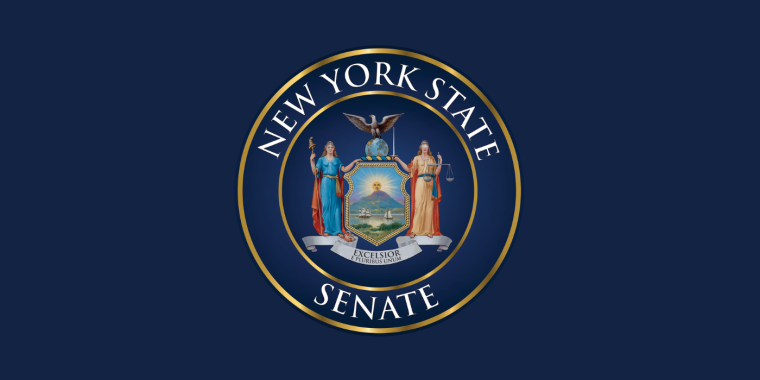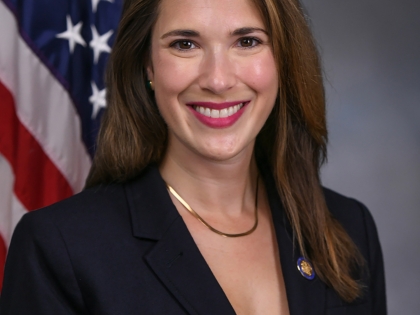
Senator Michelle Hinchey and Coalition Announce Legislation to Revolutionize the Way Municipalities Buy Food
January 27, 2022
-
ISSUE:
- Good Food Purchasing
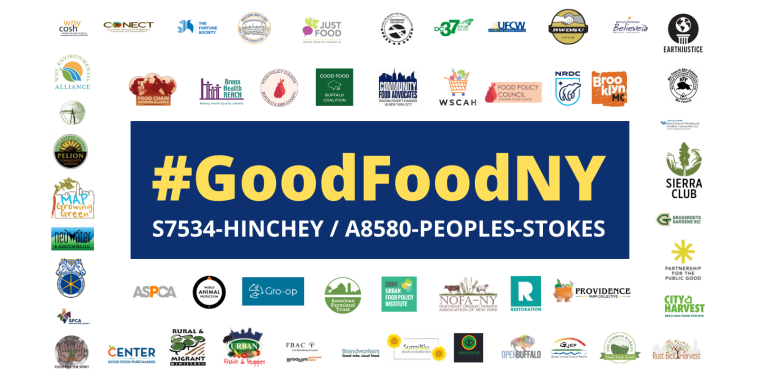
ALTAMONT, NY – Today, at Indian Ladder Farms in Altamont, Senator Michelle Hinchey announced legislation that would give all municipal institutions in New York the option to shift their food budgets to locally-based, fair, ecologically sound, and humane food sources, making it easier for communities to buy food from businesses that meet their values. The legislation (S7534/A8580), sponsored by Hinchey in the Senate and Assembly Majority Leader Crystal Peoples-Stokes in the Assembly, would make New York the first state to institute a values-based procurement model that promotes the purchase of more sustainably produced food from local economies, especially smaller-scale farms and minority-owned businesses, ensures that suppliers’ workers are offered safe and healthy working conditions and fair compensation, that livestock receive humane care and that consumers have access to nutritious meals.
New York’s municipal institutions, including schools, shelters, childcare centers, and hospitals are required by current state food procurement law to choose the lowest responsible bidder in all food purchasing decisions, preventing any further criteria from being considered.
Hinchey’s bill would bring New York’s food policies, which haven’t been updated since the 1970s, into the 21st century by creating pathways for municipalities to award food contracts to businesses that are no more than 10% more expensive than the lowest bidder if they possess one or more of the following qualities:
- Environmental Sustainability: Sourcing from producers that employ sustainable practices to improve soil health and carbon sequestration; conserve on-farm energy and water; reduce food waste and greenhouse gas emissions; reduce or eliminate synthetic pesticides and fertilizers; protect and enhance wildlife habitats and biodiversity, and more.
- Racial Equity: Opening pathways for Minority and Women-Owned Businesses (MWBE’s) and farmers to access institutional contracts.
- Fair Labor Practices: Ensuring that food suppliers respect and protect workers’ rights to organize and bargain collectively for better wages and conditions.
- Local Economic Benefit: Sourcing products whereby 51% of the raw agricultural materials have been grown, harvested, processed, and manufactured in New York State.
- Nutrition: Prioritizing purchase of healthful foods that promote well-being, namely products comprised of whole grains, fresh and minimally-processed fruits and vegetables, whole plant-based and lean proteins, and essential fats (including nuts, seeds and fish).
- Animal Welfare: Promoting humane treatment of farm animals by sourcing from farmers who prohibit intensive confinement and provide animals with enough space and enrichment to carry out natural behaviors, as illustrated by their participation in an independent animal welfare certification.
- Fair Pricing for Farmers: Supporting suppliers that pay farmers a fair price for goods using USDA pricing standards.
“Our purchasing power is one of the strongest powers we have as a society, and my bill will help communities in every corner of the state harness that influence in their food purchasing decisions, revolutionizing the way we feed New Yorkers through a values-based model driven by sustainability, equity, fairness, and inclusion,” said Senator Michelle Hinchey. “This bill is a blueprint that provides direct pathways for public institutions to reward climate-forward food production, source from producers who respect workers’ rights, support small farms and BIPOC businesses with a direct benefit to local economies, and elevate nutritious whole foods as the high-quality standard our communities deserve. When this bill is passed and signed into law, New York will become the first state to adopt values-based food procurement, empowering localities to use our tax dollars to create truly circular food economies that give back dividends to our students, seniors, and all people served by local institutions. I’m grateful for the far-reaching coalition of supporters we’ve built for this pioneering bill, and I look forward to advancing it with Majority Leader Peoples-Stokes this session.”
Assembly Majority Leader Crystal D. Peoples-Stokes said, “This important legislation brings equity, sustainability, and high-quality nutrition standards into New York’s food procurement laws. Moving beyond lowest responsible bidder through the Good Food Purchasing Program makes sense for New Yorkers and will provide nutritious, environmentally friendly food options to people in many communities that have historically been underrepresented and undervalued in this area. I am pleased to partner with Senator Hinchey on this groundbreaking legislation.”
"This bill really encapsulates the multilevel areas of food-producing that farmers are responsible for," said Laura Ten Eyck, Indian Ladder Farms General Manager. "We really appreciate the Senator's support because it's so important for New York's farmers to achieve while providing affordable and safe food in the face of climate change, while not making an existing problem worse. It's important to ensure that our employees are compensated fairly, as well. This bill will help farmers overcome the fears that currently exist while considering the many areas of food production, and making it safe for people."
Dr. Marie Wiles, Superintendent of Schools, Guilderland Central School District, said, “We are excited by the possibilities of this bill for many reasons. Not only will it provide our students with high quality nutritious foods that are locally produced, it will mean strengthening our relationships with local farmers to pave the way to educational opportunities as well. We are imagining field trips to farms or farmers and other producers coming to speak with our students, and perhaps inspiring the next generation of farmers. This initiative is also in line with our efforts to celebrate diversity, and promote equity and inclusivity in our schools and communities since it will open pathways for minority and women-owned businesses to work with our school district in our effort to provide healthy, nutritious food.”
Ribka Getachew, Director of the NY Good Food Purchasing Program Campaign at Community Food Advocates, said, “S7534/A8580 enables municipalities to opt to contract with vendors that strengthen our local and regional food economies, increase the healthfulness of food purchased, ensure resilience and sustainability throughout the supply chain, promote fair labor practices, and provide humane care for animals. We are proud to stand with Senators Hinchey and Krueger and Assembly Majority Leader Peoples-Stokes as NYS takes this tremendous step in transforming outdated procurement law. We are encouraged to know this will have a ripple effect across this country!”
Anthony M. Gaddy, Co-Founder & President/CEO of the UpState New York Black Chamber of Commerce, said, “UpState New York Black Chamber of Commerce commends Senator Michelle Hinchey and Majority Leader Crystal Peoples-Stokes on this historic legislation that will bring the food procurement system into the 21st century by expanding the criteria, and thus the options for local governments and public institutions to choose from when making their buying decisions. This legislation is not only good for businesses throughout New York State it is also good for the business of New York State.”
Stuart Appelbaum, President of the Retail, Wholesale and Department Store Union (RWDSU), said, “Communities across the state of New York spend hundreds of millions of dollars purchasing food for schools, homeless shelters, corrections facilities, and more; yet, for too long, cities have been required to accept the lowest bidder for these contracts. Often, the lowest bidder pushes costs back onto our communities. Slim margins encourage low wages, quota increases to unsustainable line speeds and health and safety concerns for workers. This important bill, led by Senator Hinchey and Assembly Majority Leader Peoples-Stokes, would allow cities to do values-based contracting. By including key values, like worker protections, environmental sustainability, and nutrition into local food service contracting we can move closer to a just and sustainable economy."
Bill Ketzer, Senior Director of State Legislation for the ASPCA Eastern Division, said, “The COVID-19 pandemic has exposed just how fragile our industrial food supply chains are, creating an urgent need to build more resilient regional food systems. This legislation will give institutions the flexibility they need to procure food from sources meeting Good Food Purchasing Program standards, including more humane treatment of farm animals. As large-scale purchasers of animal products, a shift in their preferences can drive wide-reaching improvements in farm animal treatment, and we are grateful to Senator Hinchey and Assembly Majority Leader Peoples-Stokes for seeking to ensure greater access to just, sustainable, and higher-welfare food for students and communities across New York State.”
Supporters of the #GoodFoodNY Bill Include:
Coalitions
- Good Food Buffalo Coalition
- NYC Good Food Purchasing Program Coalition
State Organizations
- UpState New York Black Chamber of Commerce
Municipal-Level
- Indian Ladder Farms (Altamont, New York)
- Guilderland Central School District
- AFSCME District Council 37 (DC 37)
- Community Food Advocates (CFA)
- CUNY Urban Food Policy Institute
- City Harvest
- Urban Fruits & Veggies/Buffalo Go Green Inc.
- Western New York Environmental Alliance
- Corbin Hill Food Project
- Western New York Council on Occupational Safety and Health
- NeuWater & Associates, LLC
National Organizations
- American Society for the Prevention of Cruelty to Animals (ASPCA)
- Earthjustice
- Retail, Wholesale and Department Store Union (RWDSU)
- Food Chain Workers Alliance (FCWA)
- Center for Good Food Purchasing
- Real Food Media
###
related legislation
Share this Article or Press Release
Newsroom
Go to Newsroom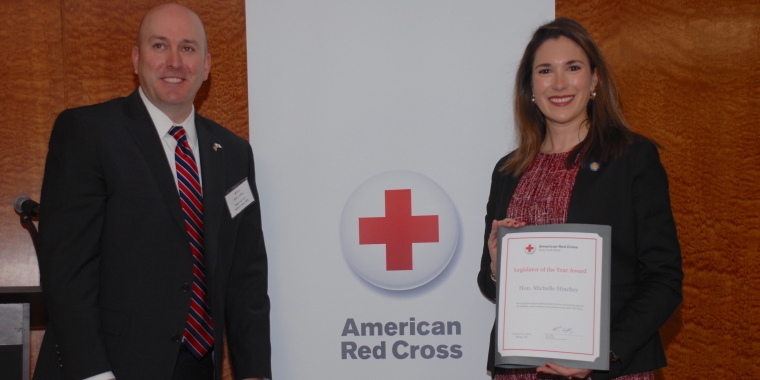
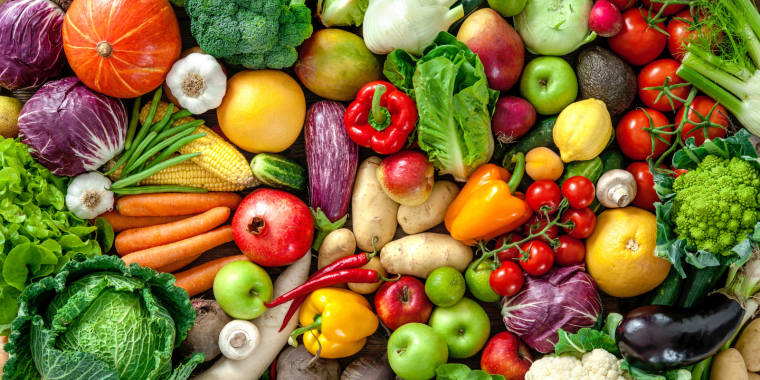
Statement from Senator Michelle Hinchey
February 2, 2023
Hinchey Calls for Central Hudson CEO to Resign
February 1, 2023
